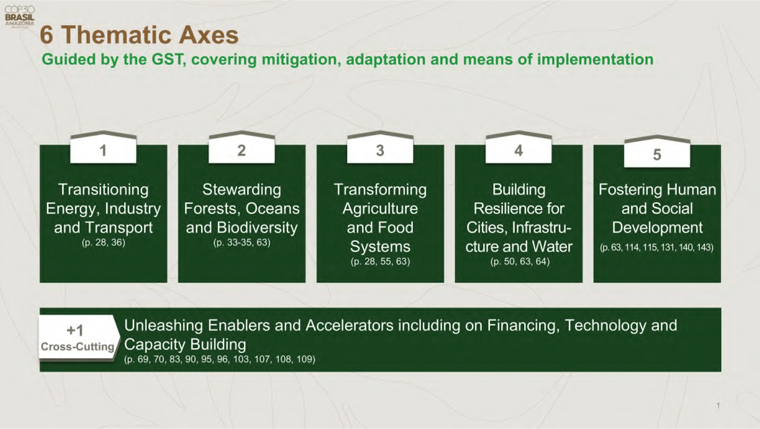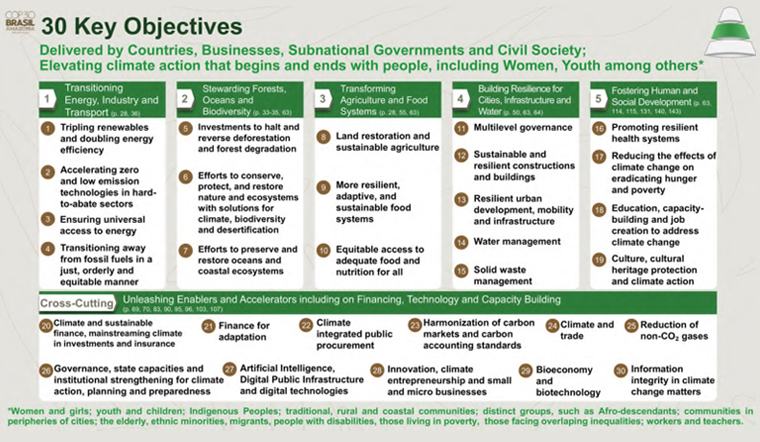From Deliberation to Action: Translating COP30 Vision for the Corporate Boardroom

Background and Context
Conference of the Parties (COP) as it is referred to, will hold its annual 30th session this year as COP30 in Belém which is in the Amazonian forest of Brazil. This is symbolic because Amazon forests are considered as the “Lungs of the World” due to largest sink or absorption of greenhouse gas emissions by the ecosystem of Amazon.
It's been ten years since the adoption of Paris Agreement in 2015, which was a historical win for multilateralism when 197 parties unanimously agreed to, inter alia, limit the global warming to well below 2.0 degrees Celsius and to preferably strive towards 1.5 degrees Celsius as a limit by the end of the century – 75 years from now, compared to pre-industrial levels. This scenario was based on solid scientific research and evidence.
The annual gatherings of COP arrive and adjourn at a diplomatic pace that is utterly disconnected from the climate emergency they are meant to be addressed, and we can clearly see that the slow march of diplomacy is being overtaken by the rapid acceleration of planetary crisis.
The slow march of diplomacy is being overtaken by the rapid acceleration of planetary crisis.
In looking back over the last 30 years, and especially since the Paris Agreement, an argument can be made that without the COPs and the global efforts in addressing climate change, global warming would be far worse than what it is. This is like the famous analogy of a glass half full or half empty when we compare the success or failure, in this case of global warming.
The fact remains that the global warming, as a result of increasing levels of greenhouse gas emissions, has already reached and may have even breached the 1.5 degree limit in 2024/25, which is happening 75 years too soon, and that is extremely worrying and alarming. The impacts are catastrophic affecting lives and livelihoods of people, especially the most vulnerable.
The global political economy is undergoing profound shifts. Rising tariffs, inflationary pressures and political instability are reshaping the national, regional and geopolitical landscapes in ways that no one could have predicted. Uncertainty, ambiguity and unpredictable outcomes will remain on the horizon.
The corporate sector has an important role to play in protecting environment integrity locally, regionally, nationally and globally. Every action by everyone towards a sustainable future adds up and is socially necessary, humanly desirable and economically profitable.
COP30 Vision
The broad vision of COP30 Presidency of Brazil is undoubtedly grounded in the goals and objectives of Paris Agreement, the most important of which is to make every effort to hold on to the 1.5 degree Celsius limit of global warming. How they set out to do that is captured in the two illustrations below and further supplemented by series of letters sent to all stakeholders by the COP30 President-designate to spell out the expectations and areas that deserve attention spanning the wide spectrum of geopolitical, socio-economic, sustainability and environmental integrity aspects. These letters can be found through their website: www.cop30.br

Can governments, and especially the private sector and their investors deliver real commitments to transform the energy system, which is the single largest driver of emissions and the greatest catalyst for solutions?

From Deliberation to Action - Powered in the Boardrooms
COP30 in Brazil comes at a critical period as a follow up to the previous COP28 in Dubai which produced the first ever global agreement to “transition away from fossil fuels”, and COP29 in Azerbaijan which highlighted the scale of resources needed to move from ambition to action. Now, COP30 is set to be a litmus test. Can governments, and especially the private sector and their investors deliver real commitments to transform the energy system, which is the single largest driver of emissions and the greatest catalyst for solutions?
It is when the going gets tough, the tough get going, as the saying goes. Amid these unprecedented geopolitical, economic and social complexities, the power of human ingenuity, perseverance and courage has historically shown that societies can change for the better. There are many examples in the history of major events and breakthroughs when all hope of revival seemed like drifting further away, there has been major breakthroughs and successes in many fields that has benefitted humanity.
I believe we are at the cusp of such a major shift and breakthrough that is embedded in the forces that are driving energy transition and sustainable development.
COP30 is set to be a litmus test. Can governments, and especially the private sector and their investors deliver real commitments to transform the energy system, which is the single largest driver of emissions and the greatest catalyst for solutions?
What happens in the board rooms in the corporate world matters for climate change and sustainability because they are in the driving seats of energy transition, innovation and sustainable development. To take that responsibility and opportunity seriously, board of directors must go beyond discussion and embed accountability, strategy, and measurable impact into their business models up-and-down the hierarchy and in the supply chains. Boards need to set clear governance and accountability by clearly defining responsibilities, assigning specific board members or committees to oversee sustainability and climate-related initiatives - such as integrating ESG - into the board agenda and making climate and sustainability a standing item in board meetings. It will be important to take proactive measures to link ESG and climate targets to performance and incentives of board-level remuneration. Once these measures are in place, the most critical task will then be to drive measurement and transparency by defining clear, measurable indicators and to make sure there is regular reporting through credible benchmark performance comparison. Finally, embed sustainability and ESG in the culture and leadership of the business.
I expect and hope to see the Indian private sector actively participate in the lead up to COP30 and in Belém – in the Green Zone of the conference – showcase their corporate values and strengths, join the wave of corporate sector that is driving scalable innovation in sustainability, make meaningful collaboration and partnerships and add to the growing chorus of voices from around the world to make our environment healthier, greener, safer and sustainable for a brighter and economically beneficial future for this and future generations.
Author

Mr. Ovais Sarmad
He served as the Deputy Executive Secretary of the UNFCCC and the Chief of Staff & Director of Resources Management at UN Migration/IOM. Over the last 33 years, he has served within the intergovernmental/multilateral United Nations System holding various roles. Currently, he is the Vice Chair at The GHG Protocol, Advisory Member of Granules India Limited & STEER World India Limited.
Owned by: Institute of Directors, India
Disclaimer: The opinions expressed in the articles/ stories are the personal opinions of the author. IOD/ Editor is not responsible for the accuracy, completeness, suitability, or validity of any information in those articles. The information, facts or opinions expressed in the articles/ speeches do not reflect the views of IOD/ Editor and IOD/ Editor does not assume any responsibility or liability for the same.

 Quick Links
Quick Links
 Connect us
Connect us




 Back to Home
Back to Home































